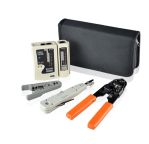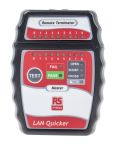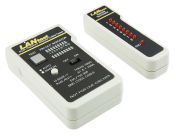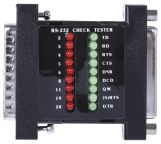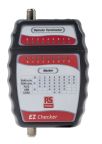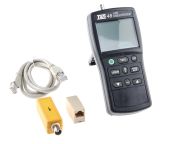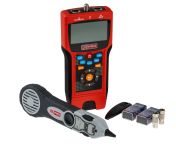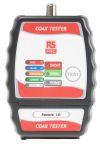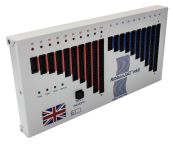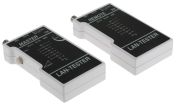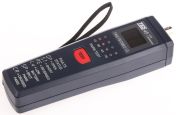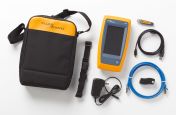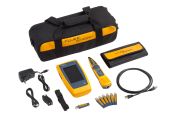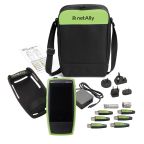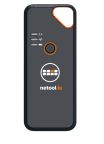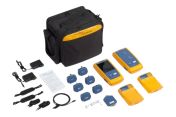Network Testers
Network testers are devices designed to measure and test the integrity of existing LAN connections. These devices, often referred to as LAN testers or ethernet cable testers, are indispensable for network installers and technicians. Whether troubleshooting an existing network or installing brand-new cable connections, a network cable tester can quickly identify faults and verify signal quality.
By pinpointing the exact cables or cores that need attention, network testers help enhance productivity and improve customer satisfaction in the IT industry. What’s more, they play a crucial role in maintaining network uptime and ensuring smooth data flow.
They can also be used to certify connections, ensuring they meet industry standards. And because network testers are compatible with both copper and fibre cabling, they are considered highly versatile tools.
Types of Network Testers
Network testers come in various forms, each designed for specific testing needs. Some common types include:
- Basic Cable Testers: These testers, also known as RJ45 testers, are used to verify the continuity of ethernet cables. Additionally, they can identify issues like open circuits, shorts, crossed wires, and split pairs. What’s more, basic cable testers are often used for simple checks before installing cables.
- Network Certifiers: Network certifiers are advanced testers that provide detailed information about the performance of a network cable. They test for various parameters, including signal strength, attenuation, and crosstalk. Also, certifiers are commonly used to ensure that cabling meets industry standards and to provide documentation for warranty purposes.
- PoE Testers: Power over Ethernet (PoE) testers are designed to verify the presence and quality of PoE signals on a network cable. They can measure voltage, current, and power levels to ensure that PoE devices are receiving the correct power.
- Network Analysers: Network analysers are tools that can capture and analyse network traffic, and they can be used to identify bottlenecks, troubleshoot performance issues, and detect security threats. Network analysers are often used by IT professionals to diagnose complex network problems.
How do Network Testers Work?
A network cable tester is an electronic device that measures the connection quality between two ends of a network cable. At the same time, it checks for proper wiring and assesses signal integrity to ensure optimal performance. There are two primary methods used by network testers to evaluate cable connections:
- Continuity Testing: This method verifies the completeness of the electrical circuit within the cable. The tester sends a small electrical current down each wire in the cable and checks for its presence at the other end.
- Resistance Testing: Resistance testing goes a step further by measuring the resistance of the cable. The tester sends both a current and a voltage down the cable and calculates the resistance based on the relationship between the two.
Network Tester Specifications
When choosing a network tester, it's important to consider the specific needs of your application. Here are some key specifications to keep in mind:
- Cable Type Compatibility: Ensure the tester supports the types of cables you'll be working with, whether it's ethernet cables, coaxial cables, or fibre optic cables.
- Bandwidth Support: Select a tester that can handle the bandwidth requirements of your network. For example, if you're working with high-speed networks, you'll need a tester that can accurately test for those speeds.
- Power Source: Consider whether you need a portable tester with battery power or a mains-powered unit for benchtop use.
- Maximum Cable Length: Check the maximum cable length the tester can handle, especially if you're working with long cable runs.
- Durability: If you'll be using the tester in harsh environments, look for a rugged model with features like water resistance and shock protection.
**Industry Applications of Network Testers **
Network testers are vital tools across a diverse range of industries, ensuring the reliable operation of critical data networks. These versatile devices are suitable for testing various types of data cables, including Cat 3C, Cat 5, Cat 5e, Cat 6, Cat 6a, Cat 6e, and Cat 7 ethernet cables. They can also be used for testing telephone lines, RJ45-fitted cables, LAN cables, and even coaxial cables in some models. Network testers are used in different sectors, including:
- IT Industry: In the IT industry, network testers are essential for maintaining network uptime and ensuring seamless data flow. IT professionals use these tools to troubleshoot connectivity issues, identify faulty cables, and optimise network performance.
- Telecommunications: Telecommunications companies rely heavily on network testers to ensure the quality of voice and data services. Also, technicians use these devices to test and certify new cable installations, troubleshoot existing lines, and maintain the integrity of their networks.
- Industrial Automation: Network testers are indispensable in industrial settings, where reliable communication networks are crucial for controlling critical processes. They are used to test and maintain the cabling infrastructure that connects various devices and systems, such as sensors, actuators, and programmable logic controllers (PLCs).
- Buildings and Infrastructures: In buildings and infrastructures, network testers help ensure that network cabling is installed correctly and meets required standards. This is essential for supporting modern building technologies, such as security systems, building automation, and internet connectivity.
What Brand Manufactures the Best and Most Accurate Testers?
The market leading brands such as Fluke Networks or Ideal Networks specialise in producing high-end network cable testers. While these devices are very accurate, they can be very expensive. For many installers or DIY enthusiasts, basic or less-expensive models from our range would be an ideal choice.
Network testers have become essential tools for businesses and IT professionals who rely on seamless network connectivity. With their comprehensive assessment capabilities, troubleshooting features, and compatibility across different network types, these testers streamline network maintenance, ensure optimal performance, and contribute to a robust and reliable network infrastructure. By investing in network testers, organisations can proactively address network issues, reduce downtime, and deliver enhanced connectivity experiences to their users.
Your Trusted Supplier of Network Testers
Whether you need an insulation resistance meter, multimeter tester, or network tester, RS Australia is your trusted source for high-quality products. We offer an extensive selection of devices from leading brands like Fluke Networks, TREND Networks, and NetAlly, catering to a wide range of needs and budgets.
Whether you're looking for a basic cable tester to verify continuity or an advanced network analyser to diagnose complex network issues, we have the right tool for you. Plus, we are committed to providing competitive prices, fast delivery across Australia, and expert support to help you make informed decisions.
Browse our range of network testers today and experience the difference that RS Australia can bring.
Related links
- Fluke Networks LinkIQ Cable Tester RJ45
- RS PRO Cable Tester Cat 5e Cat 6a LAN UTP
- Fluke LinkIQ DUO Cable+Wi-Fi+Network Network Tester Internal Antenna M12 RJ45, USB
- Ethernet Explained: Your Essential Guide to Choosing and Using Ethernet Cables
- Value Cable Tester RJ45
- Network Test & Measurement
- TREND Networks LanXPLORER PRO Cable Tester RJ45
- Amprobe LAN-1 Cable Tester BNC, RJ45
